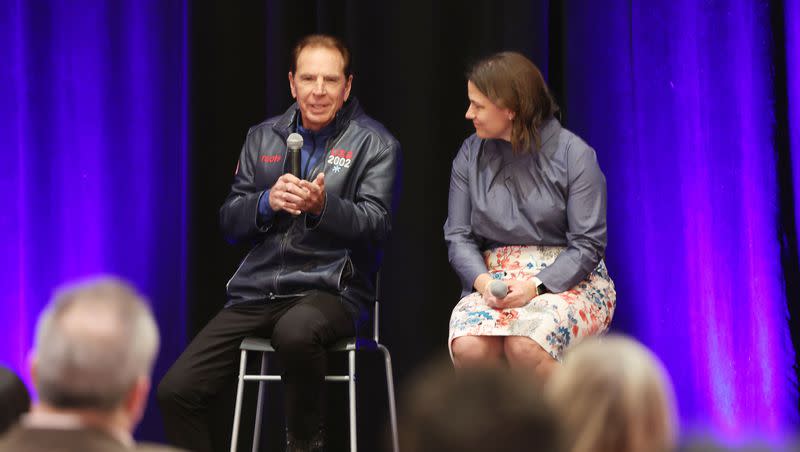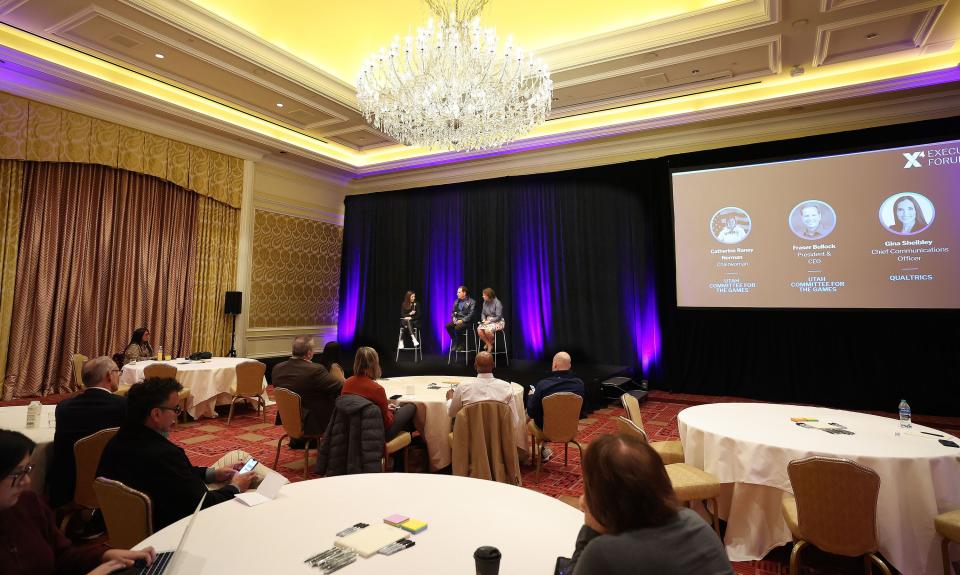Utah’s Olympic bid leaders taking on ‘a massive endeavor,’ tech boss says

- Oops!Something went wrong.Please try again later.
- Oops!Something went wrong.Please try again later.
Putting on a Winter Games is “like holding about 10 Super Bowls every day for 17 days straight,” the head of Utah’s bid to host another Olympics told business executives from around the country gathered for this year’s Qualtrics X4 user summit.
“The complexity and scope of the Games is just unbelievable to put all of those pieces together,” Fraser Bullock, president and CEO of the Salt Lake City-Utah Committee for the Games, said during an executive forum Wednesday at the Grand America hotel.
Technology plays a key role, but it’s just one of some 40 functions that make up an Olympics, compared to seven or eight for a typical business, said Bullock, the chief operating officer of the 2002 Winter Games in Salt Lake City.
Related
Ryan Smith, Qualtrics co-founder and executive chairman, kicked off the half-hour presentation by introducing Bullock and the bid committee’s chairwoman, Catherine Raney Norman, as “people who take on massive, massive things. This is a massive endeavor.”
Smith, the owner of the Utah Jazz, is a member of the bid committee seeking to host the 2030 or 2034 Winter Games.
Bullock noted that the Utah-based customer service innovator wasn’t around in 2002, so Games organizers had to get on the phone with athletes to find out what they needed to be at their best.
“When you think about the athletes, you want to have everything as perfect as possible. They train their entire lives for, in some cases it’s 30 seconds of competition,” Bullock said, adding, “We put ourselves in the shoes of our customers.”
New technology additions since the last Winter Games in Utah also include social media and the ability to virtually connect Olympians with friends and family back home during competitions.
“The evolution of technology in sport has been remarkable,” said Raney Norman, an Olympic speedskater who competed in four Winter Games, including in 2002, an experience she called “magical.”
Related
As the bid chairwoman, Raney Norman said she felt “a moment of pride” when an International Olympic Committee staffer told her she’d “never seen a more female-led, athlete-centric bid before. I was just like, ‘We’re doing this right.’”
Raney Norman pointed out Utah has become more diverse since 2002.
“Utah is dramatically changing. We’re seeing that over and over. We’re seeing more languages being spoken here. We’re seeing more ethnicities, so we have to make sure we’re reflective of that,” she said.
That makes being able to provide role models as part of the bid “absolutely critical,” Raney Norman said. “We can’t just do what we did back in ‘02. To me, that’s doing a disservice to our communities.”
Salt Lake City is one of six places looking to host a future Winter Games, the International Olympic Committee confirmed to the Deseret News this week, declining to identify the contenders involved in what were described as “confidential discussions.”
The other known bidders for the 2030 Winter Games are Sapporo, Japan; Vancouver, Canada; and possibly, a place yet to be named in Sweden, where Olympic officials are considering getting in the race.
Sweden is already being labeled the frontrunner because both Sapporo and Vancouver have run into issues with their bids, and Salt Lake City and the U.S. Olympic and Paralympic Committee have declared a preference for hosting in 2034.
Previously, interest has been expressed by Barcelona, Spain, but infighting over where to locate venues ended a try for 2030. And what’s been called a “European super bid” involving France, Italy and Switzerland appears to have stalled.
Talking with reporters after the presentation, Bullock said again Utah is hoping to wait to host until 2034, because of the impact on sponsorship sales following the 2028 Summer Games in Los Angeles.
“We’re actually cheering for someone else to come forward for 2030 and put together a great bid so that they could be selected for 2030,” he said. “Our best hope is that there’s a great candidate for 2030 and we come in for 2034.”
Related
His “dream case” also includes both the 2030 and 2034 Winter Games being awarded at the same time, likely next year after IOC leaders decided last December to delay making a pick under their new, less formal bid process.
Bullock acknowledged it’s “a possibility” that Salt Lake City may end up facing more competition for 2034 because of the unnamed bids. He said, however, “it’s really challenging” to actually put together a bid.
“We have everything in place to put on great Games,” Bullock said. “I’m not that concerned about not getting a Games. I’m hopeful and pretty confident we’ll get awarded a Games here in the not too distant future.”
He also said there’s a significant role for Utah’s Silicon Slopes tech community in another Olympics, serving as a “think tank” for organizers as well as offering their workforce as volunteers.
Some, such as Qualtrics, could become sponsors, Bullock said, as could the companies represented by the 50 or so executives who attended Wednesday’s presentation on the Winter Games bid.
“Utah is not only a state of sport, but it’s a state of technology with Silicon Slopes. We view that as a huge strategic asset,” he said, touting the bid’s “amazing collaboration and partnership with the business community ... The business community loves this.”


